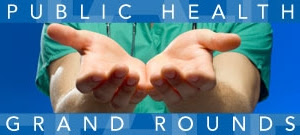
We are pleased to present the April session of CDC Public Health Grand Rounds, “Prevention and Control of Skin Cancer.” This session will be available via live webcast from CDC headquarters in Atlanta, Georgia on Tuesday, April 21, at 1 p.m. (EDT) at http://www.cdc.gov/
Skin cancer is the most common form of cancer in the United States, affecting 5 million individuals each year. The two most common types of skin cancer—basal cell and squamous cell carcinomas—are highly curable, but can be disfiguring and costly. Melanoma, the third most common skin cancer, is the deadliest kind of skin cancer, resulting in approximately 9,000 deaths each year. Most cases of skin cancer are preventable, but despite efforts to address risk factors, skin cancer rates have continued to increase in the United States and worldwide.
The most preventable cause of skin cancer is exposure to ultraviolet (UV) light either from the sun or from artificial sources like tanning beds. Rates of sunburn remain high, affecting nearly 37 percent of Americans each year as a result of overexposure to UV rays. Indoor tanning is especially dangerous, resulting in an estimated 400,000 cases of skin cancer in the US each year. Skin cancer is a serious public health concern and it will take a comprehensive approach, involving healthcare providers, community partners, and business and government leaders working together to provide individuals with the information they need to reduce UV exposure and promote policies that advance the national goal of preventing skin cancer.
Join us for this session of Grand Rounds as our esteemed panel discusses the prevention and control of skin cancer, with particular attention to how we all can help people protect their skin and their lives while enjoying the outdoors.
Future Grand Rounds topics include “Dengue and Chikungunya in Our Backyard: Preventing and Controlling Mosquito-Borne Viruses” and “Measles Elimination: Global Progress and Challenges.”
Email your questions about this topic before or during the session. Follow us on Twitter #cdcgrandrounds
Presented By:
Meg Watson, MPH
Epidemiologist, Epidemiology and Applied Research Branch
Division of Cancer Prevention and Control
National Center for Chronic Disease Prevention and Health Promotion, CDC
“Skin Cancer: Common and Preventable”
Sharon McKenna, BA
Program Manager, Arizona SunWise Skin Cancer Prevention Program,
Bureau of Epidemiology & Disease Control, Arizona Department of Health Services
“Skin Cancer Prevention in Arizona”
Jeff Gershenwald, MD
Medical Director, Melanoma and Skin Center
University of Texas MD Anderson Cancer Center
“Melanoma Moon Shot: MD Anderson’s Comprehensive Approach to Melanoma and Skin Cancer”
Boris Lushniak, MD, MPH
Rear Admiral, U. S. Public Health Service
Deputy Surgeon General
“A Comprehensive Approach to Skin Cancer Prevention”
Facilitated By:
John Iskander, MD, MPH, Scientific Director, Public Health Grand Rounds
Phoebe Thorpe, MD, MPH, Deputy Scientific Director, Public Health Grand Rounds
Susan Laird, MSN, RN, Communications Director, Public Health Grand Rounds
For non-CDC staff or those outside of the CDC firewall:
A live external webcast will be available. Presentations are archived and posted 48 hours after each session. Due to security measures at CDC’s Roybal campus, non-CDC staff who wish to attend these sessions in person must have prior clearance and a U.S. state-issued photo ID (e.g., driver’s license, US passport).
Names of non-CDC staff (both domestic and international) should be submitted to the Grand Rounds Team. Please note that all information for international visitors must be submitted at least 10 days in advance.
Grand Rounds is available for Continuing Education.
ALL Continuing Education hours for Public Health Grand Rounds (PHGR) are issued online through the CDC/ATSDR Training and Continuing Education Online system. If you have questions, e-mail or call Learner Support at 1-800-418-7246 (1-800-41TRAIN).
Those who attend PHGR either in person, Envision, IPTV, or “web on demand” and who wish to receive continuing education must complete the online seminar evaluation. Thirty days from the initial seminar the course number will change to WD2346 and will be available for continuing education until February 18, 2016. The course code for PHGR is PHGR10.
Target Audience: Physicians, nurses, epidemiologists, pharmacists, veterinarians, certified health education specialists, laboratorians, others
Objectives:
- List key measures of burden of disease involving morbidity, mortality, and/or cost.
- Describe evidence-based preventive interventions and the status of their implementations.
- Identify one key prevention science research gap.
- Name one key indicator by which progress and meeting prevention goals is measured.
CE certificates can be printed from your computer immediately upon completion of your online evaluation. A cumulative transcript of all CDC/ATSDR CE’s obtained through the TCE Online System will be maintained for each user. We hope that this will assist CDC staff and other public health professionals to fulfill the requirements for their professional licenses and certificates.





















.png)









No hay comentarios:
Publicar un comentario